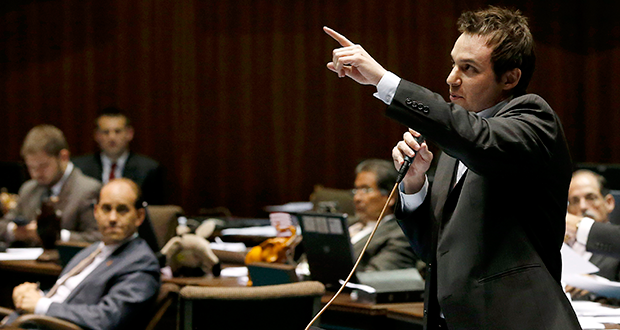School districts oppose proposed cut in career-focused education
Kiera Riley Arizona Capitol Times//September 21, 2025//
School districts oppose proposed cut in career-focused education
Kiera Riley Arizona Capitol Times//September 21, 2025//
Key Points:
-
Districts consider suing EVIT over funding cuts
-
EVIT ties money to performance metrics and outcomes, citing audit
-
Schools fear reduced funding from EVIT will harm Career and Technical Education programs
A handful of school districts are mulling litigation against the East Valley Institute of Technology after a negotiation breakdown over a proposal to decrease funding and tie dollars to performance in the latest intergovernmental agreement.
EVIT maintains its newest proposal to reduce funding is in line with statute and in the spirit of recommendations from the Auditor General’s Office to keep a tighter hold on funds and outcome data.
But districts are concerned about a reduction in funding for Career and Technical Education programs. One district, Chandler Unified School District, claims the funding decrease stands to impact its access and ability to offer programming, especially as program costs rise.
“We are not in agreement with the proposed financial reductions which could be harmful to the programs that are on our six high school campuses,” Stephanie Ingersoll, spokesperson for Chandler Unified School District said in a statement. “Funds are used to ensure satellite programs have highly qualified teachers and industry standard equipment and supplies. CTE classrooms are more expensive to run.”
Four other districts — Gilbert Public Schools, Queen Creek Unified School District, Cave Creek Unified School District and J.O. Combs Unified School District — have so far only discussed the matter in executive session and have declined to comment on the issues with the intergovernmental agreement.
All five districts voted to bring on special counsel from Osborn Maledon and greenlit legal action “if needed.”
State law requires all school districts participating in a career technical education district to enter an intergovernmental agreement to outline finances, oversight and responsibilities of all parties involved.
Per the former intergovernmental agreement, entered in 2022, EVIT agreed to pay 85% of satellite funding in fiscal year 2023, 86% in 2024 and 87% in 2025.
In the latest proposal from EVIT, the district decreases the satellite funding to 83% in the first year.
In the second year, EVIT would reduce funding again to 78%, though with the offer for an additional 1% if 75% of EVIT Satellite programs have persistence rates of at least 30% and another 1% if 100% of instructors satisfy a metric set out in the Industry Related Educational Effectiveness quality indicator.
The percentage would drop an additional 3% to 75% in the next fiscal year, though again with increased funding contingent on specific metrics.
In the third year, districts could receive an additional 2% with 32% persistence rates, another 1% if at least 70% of students enrolled in the final course of a program earn a certificate, and another 1% if instructors hit the benchmark for educational effectiveness.
“Without those systems and without that data, there’s no assurance that the 89 plus million dollars that EVIT was sitting on for CTE programming for satellite was actually a return on the investment of the taxpayers,” EVIT Superintendent Chad Wilson said.
Wilson pointed to a 2024 review by the Auditor General’s Office as a reason for the change.
The report found the district lacked “complete and reliable” outcome data to show that dollars translated to students’ preparedness and ready for high-need occupations.
The auditor general recommended EVIT “(d)evelop and implement consistent data collection protocols for all CTE programs to demonstrate compliance with statutory and ADE requirements and recommended practices, and analyze all CTE program outcome data to evaluate the effectiveness of the CTE programs in preparing students for high-need occupations and to support the investment of any public monies.”
A follow up report in July found EVIT had taken steps to refine data collections for its central programs, but had not yet started collecting outcome data from districts. Due to the ongoing data collection efforts, the auditor general noted that the district still lags in data analysis.
“For us, it was an eye opening conversation with the auditor general,” Wilson said. “This idea was born of saying, let’s make sure that we are being — not just in words, but in actions — good stewards of our taxpayer dollars. The way you do that is you have systems in place to track the data. You have systems in place to look at the data and the outcomes and allow you to make informed decisions about whether or not it is a good return on investment.”
Ingersoll said the provisions to reduce guaranteed funding were “problematic.”
She noted the district sent out its own proposed IGA in February but did not hear back from EVIT until May, and then again in July with the current proposal at issue.
And, as for performance metrics, Ingersoll noted the district’s CTE programs have historically met state standards and are considered high quality.
“The Arizona Department of Education monitored CUSD CTE programs and awarded all CTE programs in our district the top two highest rankings. There are four rankings possible. Many of our programs have received awards and our students have the ability to enter the workforce after program completion with appropriate certifications,” Ingersoll said in a statement.
This all plays into the bigger fear of disrupted or closed programs given reduced guaranteed funding, a prospect Wilson rebuts.
“My governing board has no intention to go about closing programs,” Wilson said. “Our belief is, whether it’s a central campus program or satellite campus program, we want to create opportunities for all kids to have quality experience in CTE, but quality experience has to offer a betterment of outcomes.”
According to Wilson, EVIT has yet to see a complaint filed on the districts’ behalf.
In the meantime, Wilson said “there’s always room for negotiation,” but noted a clear understanding that the question of how dollars translate to outcomes will continue to be important to EVIT governing board members.
“I always am hopeful that we could get a resolution without going to the courthouse, as long as there’s willingness on both sides to enter into a good faith negotiation,” Wilson said. “But at the same time, I do recognize that may not necessarily be a path that both parties wish to pursue, and if that path isn’t the path that both parties wish to pursue, then EVIT is very comfortable in stating its case to a third party, to the court.”














































